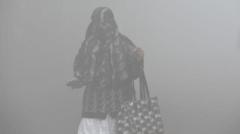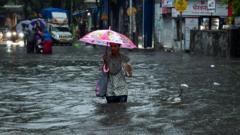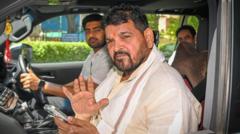Increasing air pollution in Delhi, marked by hazardous levels during winter months, has forced families like Saurabh Bhasin's to flee to places like Goa. While some can afford to escape, millions remain trapped, battling the impacts of smog on their health and livelihoods.
Families Escape Delhi's Smog: The Fight for Clean Air

Families Escape Delhi's Smog: The Fight for Clean Air
As pollution levels soar in Delhi, some families are making the difficult decision to leave the city in search of cleaner air and better health.
Article Text:
Saurabh Bhasin's journey from Delhi to the coastal state of Goa stems from a desperate need for cleaner air after his daughter was diagnosed with asthma. A lifelong resident, Bhasin cherished Delhi, especially its winters. However, as pollution levels skyrocketed, transforming vibrant streets into hazardous zones, his affection turned into anguish.
In 2015, Bhasin and fellow parents appealed to the Supreme Court, urging a ban on firecrackers primarily used during festive occasions, citing the alarming deterioration of air quality due to factors such as traffic congestion, dust, and industrial emissions. While the court imposed regulations, the air quality continued to decline, culminating in a critical health scare for Bhasin's daughter in November 2022.
His move to Goa, 2,000 kilometers away, represents a choice not available to countless others in Delhi who cannot abandon their jobs or homes. “We know that just moving doesn’t erase her asthma, but remaining in Delhi would have exacerbated it,” he reflects.
Delhi's winter air quality often reaches levels deemed hazardous by the World Health Organization. Vulnerable populations, such as children and the elderly, face elevated health risks, leading to governmental advisories urging limited outdoor activity during severe pollution episodes.
Bhasin criticizes the temporary measures aimed at combating pollution, advocating for systemic solutions rather than temporary patches. “The challenge is investing in real solutions instead of continuously applying band-aids,” he states.
Another resident, Rekha Mathur, a mother who relocates to the outskirts of Dehradun every winter, echoes this sentiment. She, too, laments the air quality that forces her family apart. Her husband remains in Delhi for work while she navigates parenting alone due to pollution concerns.
A long-term resident, journalist Om Thanvi, found respite in Rajasthan after leaving Delhi, where he no longer requires an inhaler. His experience is a stark reminder of the consequences of poor air quality, highlighting that while the cultural vibrancy of Delhi is missed, health takes precedence.
Despite the continuous discourse surrounding air pollution, concrete improvements remain elusive. Measures this winter included restrictions on construction and industrial activities, yet many residents feel trapped in a cycle of debate with little effect on the quality of their environment.
For those like Sarita Devi, who cannot afford to leave, the struggle is constant. Working outdoors in perilous air conditions, she grapples with the reality that relocation isn't a viable option for her.
Ultimately, Bhasin's decision to relocate to Goa signifies a growing awareness that many families are prioritizing health over the comfort of familiarity. “Leaving was challenging, but our child's well-being was paramount,” he declares.
Saurabh Bhasin's journey from Delhi to the coastal state of Goa stems from a desperate need for cleaner air after his daughter was diagnosed with asthma. A lifelong resident, Bhasin cherished Delhi, especially its winters. However, as pollution levels skyrocketed, transforming vibrant streets into hazardous zones, his affection turned into anguish.
In 2015, Bhasin and fellow parents appealed to the Supreme Court, urging a ban on firecrackers primarily used during festive occasions, citing the alarming deterioration of air quality due to factors such as traffic congestion, dust, and industrial emissions. While the court imposed regulations, the air quality continued to decline, culminating in a critical health scare for Bhasin's daughter in November 2022.
His move to Goa, 2,000 kilometers away, represents a choice not available to countless others in Delhi who cannot abandon their jobs or homes. “We know that just moving doesn’t erase her asthma, but remaining in Delhi would have exacerbated it,” he reflects.
Delhi's winter air quality often reaches levels deemed hazardous by the World Health Organization. Vulnerable populations, such as children and the elderly, face elevated health risks, leading to governmental advisories urging limited outdoor activity during severe pollution episodes.
Bhasin criticizes the temporary measures aimed at combating pollution, advocating for systemic solutions rather than temporary patches. “The challenge is investing in real solutions instead of continuously applying band-aids,” he states.
Another resident, Rekha Mathur, a mother who relocates to the outskirts of Dehradun every winter, echoes this sentiment. She, too, laments the air quality that forces her family apart. Her husband remains in Delhi for work while she navigates parenting alone due to pollution concerns.
A long-term resident, journalist Om Thanvi, found respite in Rajasthan after leaving Delhi, where he no longer requires an inhaler. His experience is a stark reminder of the consequences of poor air quality, highlighting that while the cultural vibrancy of Delhi is missed, health takes precedence.
Despite the continuous discourse surrounding air pollution, concrete improvements remain elusive. Measures this winter included restrictions on construction and industrial activities, yet many residents feel trapped in a cycle of debate with little effect on the quality of their environment.
For those like Sarita Devi, who cannot afford to leave, the struggle is constant. Working outdoors in perilous air conditions, she grapples with the reality that relocation isn't a viable option for her.
Ultimately, Bhasin's decision to relocate to Goa signifies a growing awareness that many families are prioritizing health over the comfort of familiarity. “Leaving was challenging, but our child's well-being was paramount,” he declares.





















